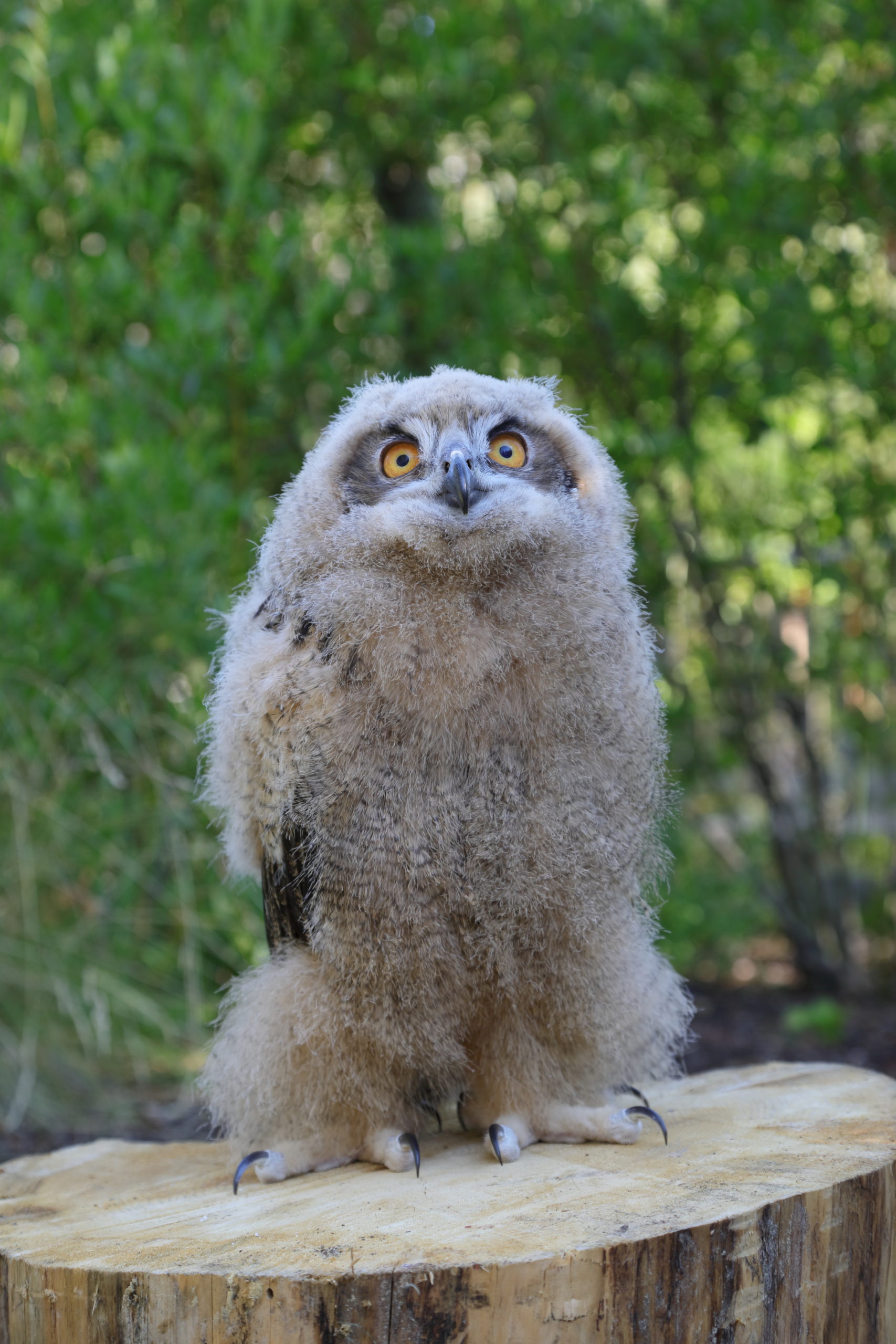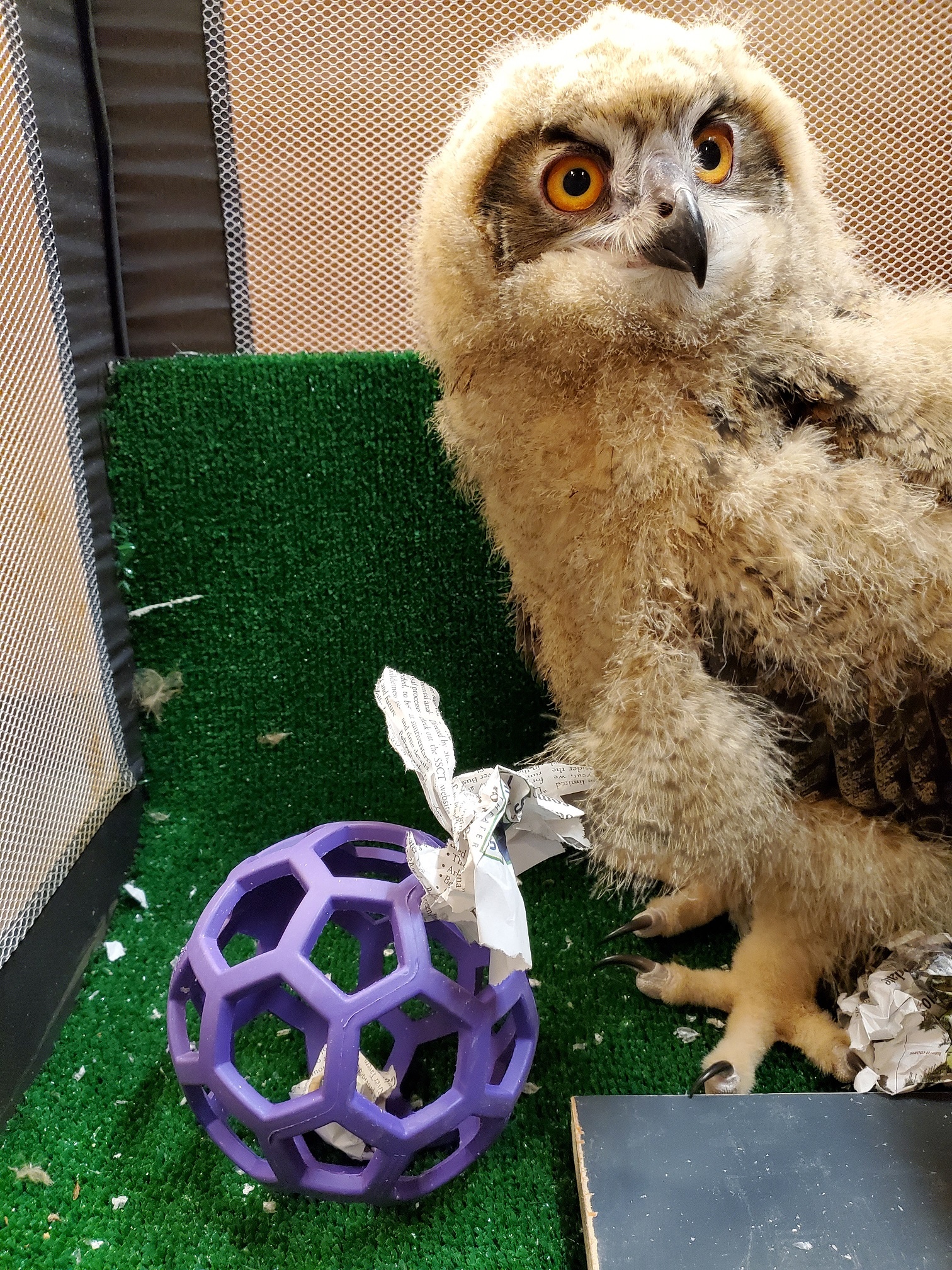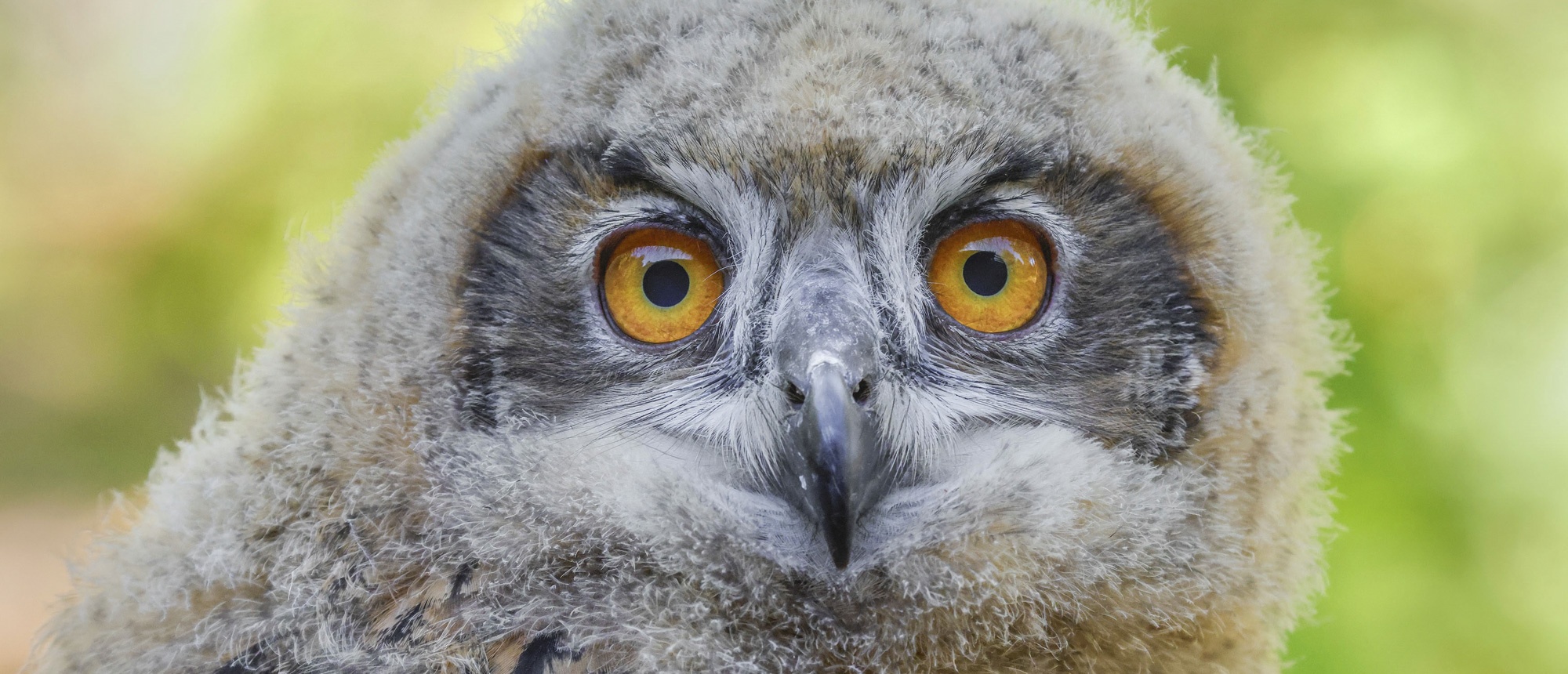Amanda Accamando, Nature Center Manager
7/31/2020
 Large piercing orange eyes. A 6 foot wingspan. 10 pounds of muscle, bone, and feathers. Prominent ear tufts. And no natural predators. Meet Sunriver Nature Center & Observatory’s (SNCO) newest animal ambassador – a Eurasian Eagle-owl (Bubo bubo). At just two months old, however, the yet-to-be-named female owlet, is still very much fluff and only beginning to learn how to fly.
Large piercing orange eyes. A 6 foot wingspan. 10 pounds of muscle, bone, and feathers. Prominent ear tufts. And no natural predators. Meet Sunriver Nature Center & Observatory’s (SNCO) newest animal ambassador – a Eurasian Eagle-owl (Bubo bubo). At just two months old, however, the yet-to-be-named female owlet, is still very much fluff and only beginning to learn how to fly.
Eurasian Eagle-owls are known as the world’s largest owls, with females significantly larger than their male partners. As their name suggests these owls are found throughout Europe and Asia as well as in northern Africa. They occupy many different habitats through their range including woodlands, deserts, mountains, and open grasslands. Their large size and silent hunting capabilities makes this species a formidable apex predator having no natural predators of their own once they reach maturity. Their expansive range, the many different types of habitat they occupy, and their position at the top of the food chain, is not unlike that of the Great Horned Owl which occupies a similar ecological niche in the Western hemisphere.
After nearly a year of quiet but intense anticipation, the one-month old owl finally made the journey via car from Buffalo, New York to Sunriver accompanied by a member of SNCO’s animal care staff. The owlet, who was born at a wildlife center, spent the first couple of weeks with its owl parents and was then hand raised, along with its sibling, by humans. Owls that are reared by humans during formative periods of their development, a process known as imprinting, are known to generally adapt well to life in human care and make the best co-workers in ambassador animal programs. By contrast, owls that are raised by their own species, such as those that may come to live in human care after rehabilitation from an injury, may not adapt well to regular human contact. Joe, the Great Horned Owl that lives at the nature center, is an example of the latter case. Although his caretakers work patiently with him every day in a minimally obtrusive way, his lack of experience with the human world means that he is most comfortable out of the spotlight and helping to educate our visitors from the safe space of his aviary. It’s important to note here that although research has shown that owls thrive when raised by humans, owls never make good pets and it is illegal to possess an owl as a pet.
 Over the next few months, the owl will be learning all about its environment, carefully guided by her caretakers. At this age, exposure to many different sights, sounds, people, and places will help her prepare for just about anything she may encounter in her role as an ambassador of bird conservation at SNCO. As she learns to fly, we will introduce training sessions to her daily routine. These training sessions, based in positive reinforcement, will foster a long-term trusting relationship with her caretakers and give her the ability to make choices in her environment. Training behaviors such as voluntarily stepping on a scale, or lifting a foot up to be examined, will also help her caretakers and veterinarian monitor her health in a minimally invasive way without force. For now, the SNCO team is enjoying getting to know our newest co-worker. We have discovered that she loves shredding old issues of the Sunriver Scene. She takes long naps in the most surprising of ways – flat on her stomach with her legs stretched behind her. She is starting to explore new foods, though mice remain her favorite so far. And she’s met numerous families during our weekly animal storytime. The owl does not have a name however, so we are asking for suggestions from her peers – children. You can submit a name online at: www.snco.org/nametheowl. Once she is able to fly, you’ll be able to visit the owl in her aviary at the nature center. Until then, check out our calendar for a schedule of our family-friendly animal storytimes and private meet and greets with the owl. Lastly, if you are interested in sponsoring our newest animal ambassador, please contact us at give@snco.org.
Over the next few months, the owl will be learning all about its environment, carefully guided by her caretakers. At this age, exposure to many different sights, sounds, people, and places will help her prepare for just about anything she may encounter in her role as an ambassador of bird conservation at SNCO. As she learns to fly, we will introduce training sessions to her daily routine. These training sessions, based in positive reinforcement, will foster a long-term trusting relationship with her caretakers and give her the ability to make choices in her environment. Training behaviors such as voluntarily stepping on a scale, or lifting a foot up to be examined, will also help her caretakers and veterinarian monitor her health in a minimally invasive way without force. For now, the SNCO team is enjoying getting to know our newest co-worker. We have discovered that she loves shredding old issues of the Sunriver Scene. She takes long naps in the most surprising of ways – flat on her stomach with her legs stretched behind her. She is starting to explore new foods, though mice remain her favorite so far. And she’s met numerous families during our weekly animal storytime. The owl does not have a name however, so we are asking for suggestions from her peers – children. You can submit a name online at: www.snco.org/nametheowl. Once she is able to fly, you’ll be able to visit the owl in her aviary at the nature center. Until then, check out our calendar for a schedule of our family-friendly animal storytimes and private meet and greets with the owl. Lastly, if you are interested in sponsoring our newest animal ambassador, please contact us at give@snco.org.

